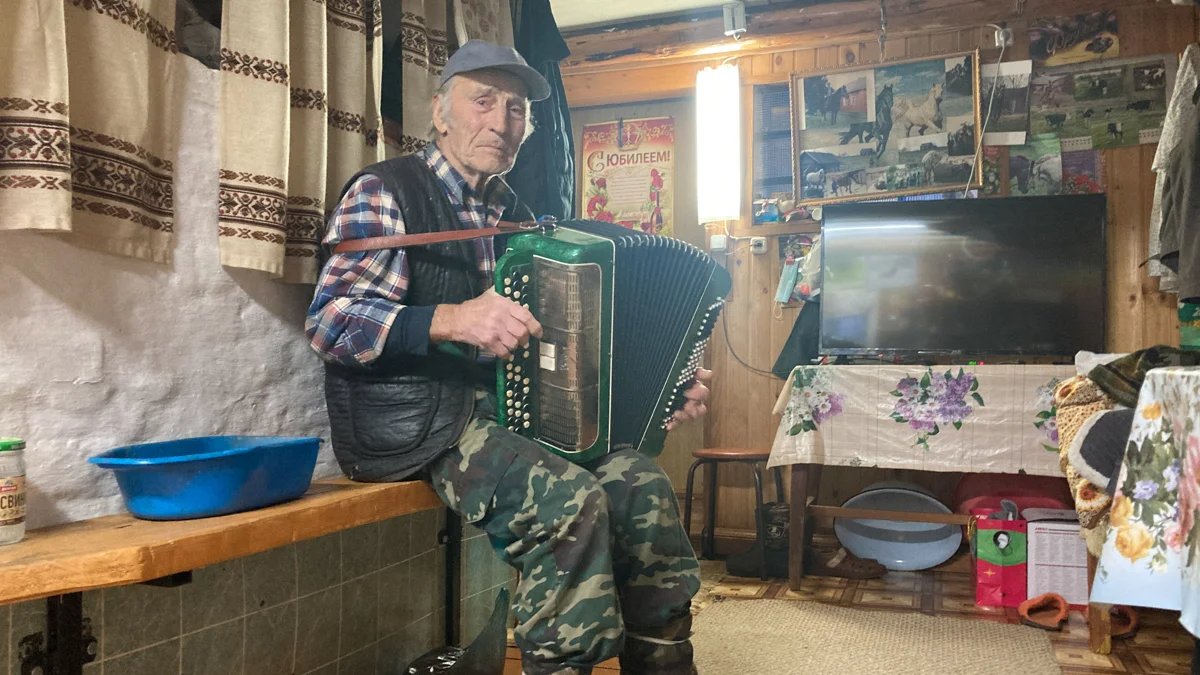Despite being halfway between Moscow and St. Petersburg, the unusually named village of Budushchee, Russian for “the future”, can only be reached via dirt road, assuming, of course, that it’s been levelled recently. If it hasn’t, then you’re perhaps best off not going at all — very few vehicles come this way, there’s no mobile service, and even if there were, there’d be nobody to call for help anyway.
Just three streets make up the village of Budushchee itself, none of which has street lights. As well as lacking mobile coverage, the village has no running water or gas and is totally unserved by public transport. It has neither a shop nor a pharmacy, though, as locals are sure to tell you, there is a natural spring that runs with holy water flows and — inevitably — TV reception. To cap it all, the dirt track ends at Budushchee, so there’s nowhere to go beyond the future.
As the road winds its way through the forest, the old village sign appears out of the snow, though the name is so obscured by rust that it’s hard to make out at first. In fairness, there’s a far newer village sign too, but it clearly hasn’t occurred to anybody to take the old one down. Most of the houses in the village are either boarded up or falling down, and I’m told that there are some 20 residents still living in the latter.
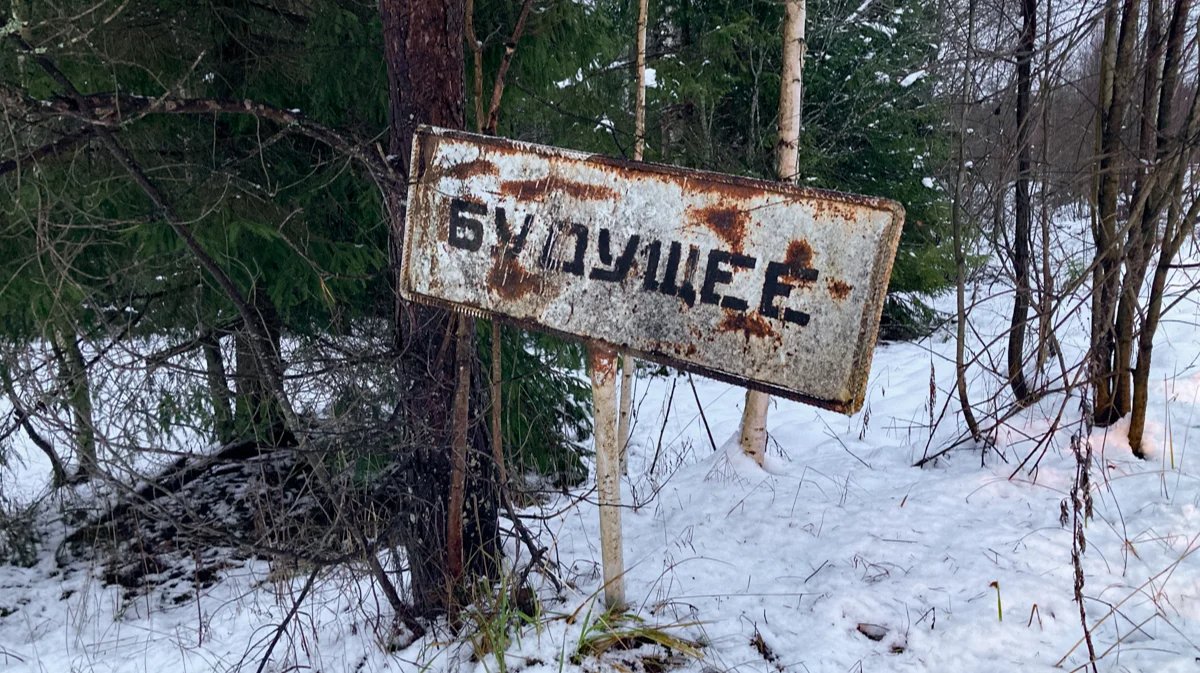
The Budushchee village sign. Photo: Irina Garina
While there hasn’t been a school in Budushchee for years, the memory of a school lives on through Shkolnaya Street, where a crooked black wooden house with new windows is the only one of several properties still being used.
Mikhail has lived in his house here for his entire life, and painted it a cheerful yellow with his wife before she died. The paint has largely peeled off now, but you can make it out in parts. The spikes on the gate are embellished with beer cans, while the gate itself is locked from the inside.
Shuffling along slowly in rubber boots, it’s clear that 77-year-old Mikhail has trouble walking, and he sometimes pauses to hold onto the wall. Next to the house, he tends a field of potatoes and looks after Zorya, his cow, whom he describes ironically as his daughter, adding that “she’s also the sole breadwinner” of the household.
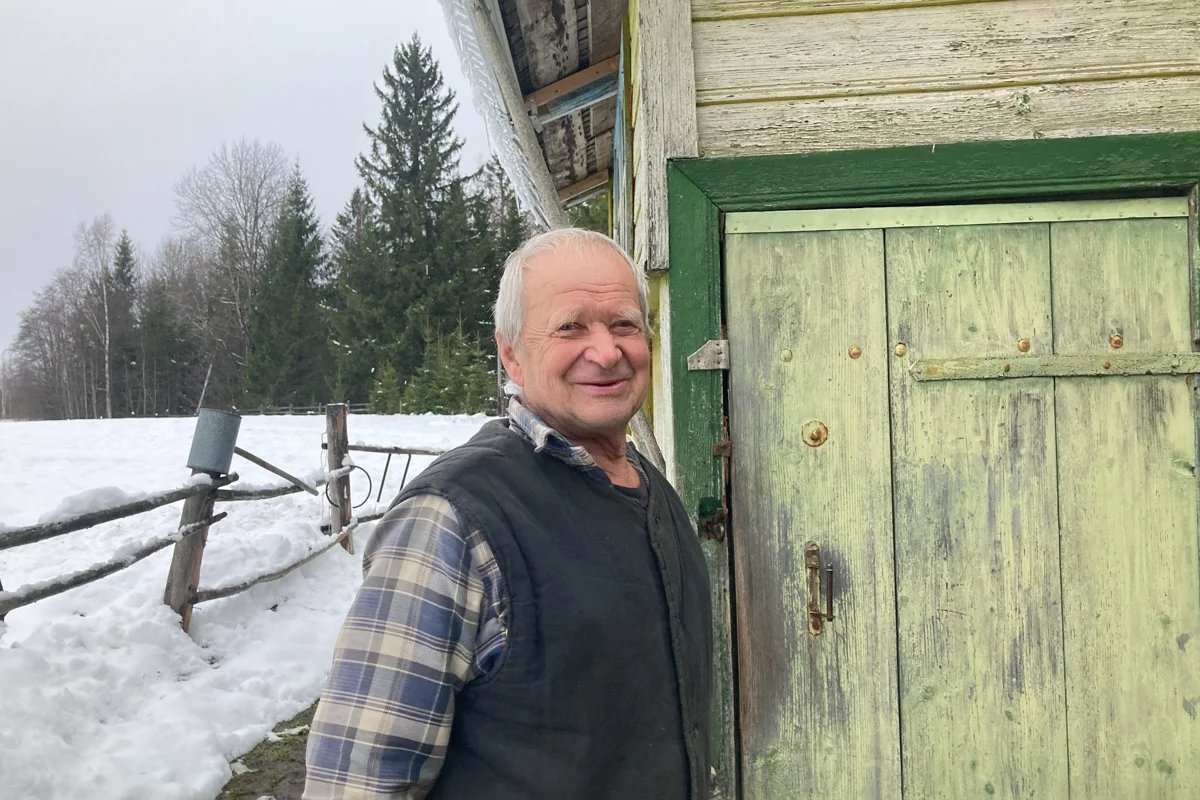
Mikhail by his home in Budushchee. Photo: Irina Garina
Mikhail recalls the village being “exceptionally large” in his childhood, and remembers it as full of people and houses, beyond which there was a collective farm named after Stalin, as well as a pig farm and a distillery that used frozen or rotten potatoes that were no good for anything else to make a 70° proof spirit.
The head of the distillery in those days was a respected figure, who had the road to Budushchee paved, Mikhail tells me. But once the perhaps 500-strong village population began to die off, either from old age or — as was generally more common — from vodka consumption, the village began its precipitous decline in the 1990s.
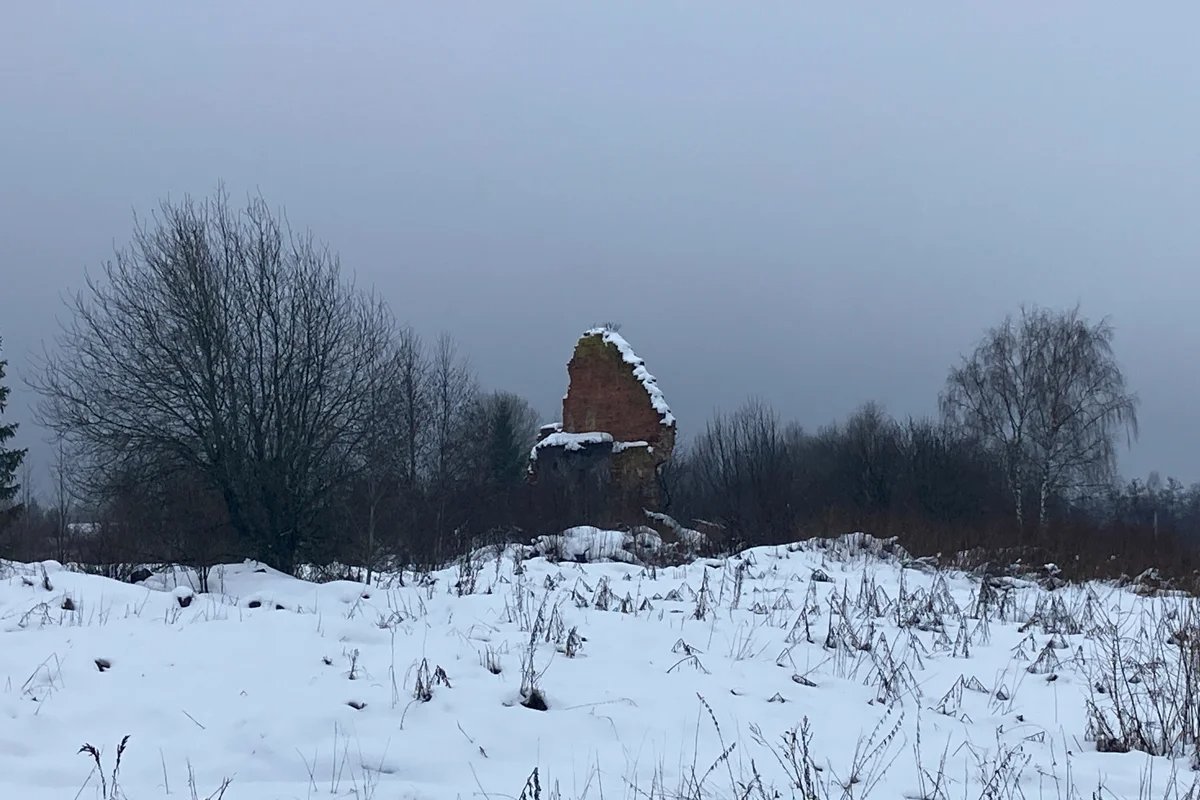
The ruins of the distillery. Photo: Irina Garina
All that’s left of the distillery today are the remains of a brick wall on a hill. In the summer months it’s easy enough to get up there if you need to make a phone call, as you can usually catch mobile reception at the top. Even up there, it can be hit-and-miss though, and you may have to resort to tossing your phone into the air in the hope that the message will get through while it’s airborne. There’s no way to get up the hill in winter, though. You could be buried alive in the snow.
“We have no mobile coverage, it’s true,” Mikhail agrees. “But the TV works. You can’t live without TV!”
Bright future
Before the October Revolution, the village was called Svyatoe (“holy”), after the small lake of the same name next to it. There was once an estate on the shore that changed hands several times before being bought by Swiss industrialist Heinrich Vollenweider in the early 20th century. Having planted an apple orchard and built a brick distillery complete with wine cellars where he employed seven people, Vollenweider was forced to flee with his family once the Soviets came to power.
One local yarn recounts how the earth swallowed up the village chapel one night, only for it to be replaced by a spring that ran with holy water.
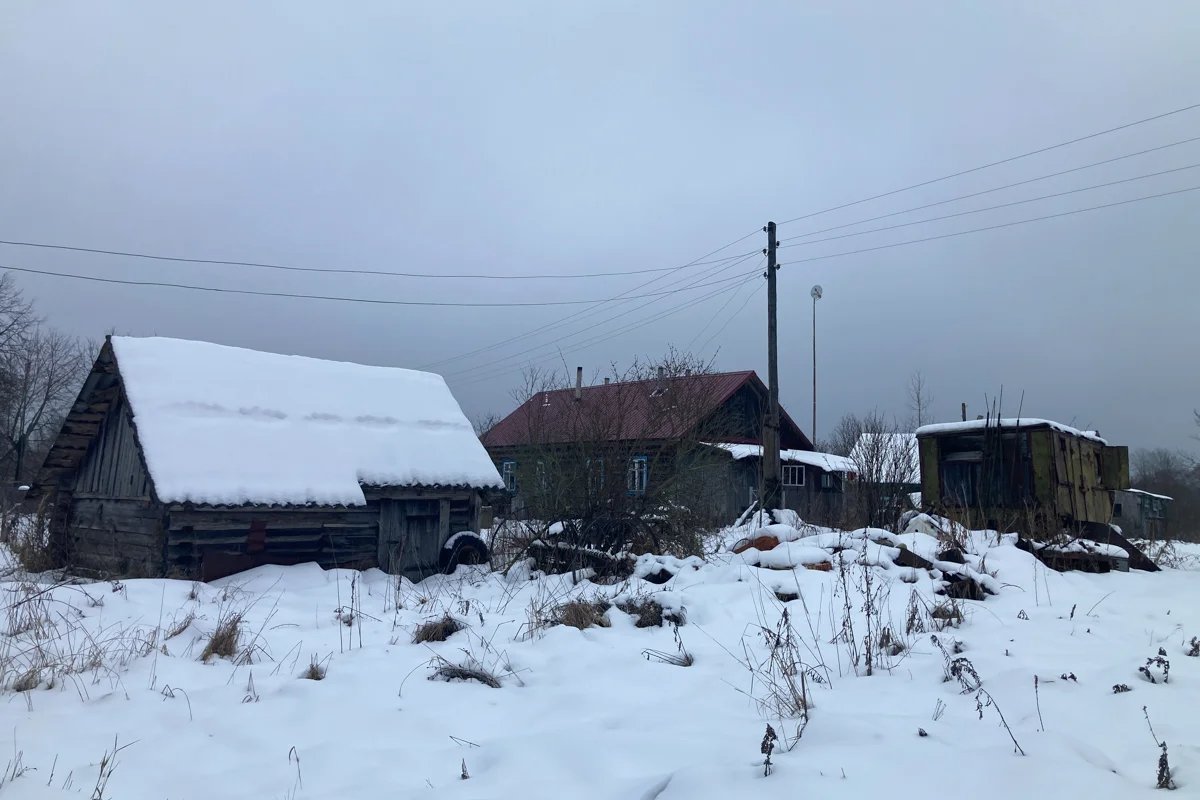
Budushchee. Photo: Irina Garina
“I think the village was renamed because of the distillery,” Mikhail assures me. “The distillery remained after the owner fled, and where there’s a distillery, there’s a bright future.”
Budushchee also has a water tower, but has no water supply, and never has had. Inexplicably, just a tower was built on the site of the old manor house.
“Those with better finances dig their own well,” says Tatyana, another local who moved here with her family 36 years ago. “I go to the public well or take water from the lake. Those who can be bothered go to the spring for holy water, but I don’t.”
Uninterrupted TV
At the other end of Budushchee, village elder Yury, who recently turned 84, opens the door to his solid brick house to me. “Look how many horses I had,” he says, gesturing towards a wall of photos from the time he had his own farm. “And I had cows... Now there’s only Boy and the chickens left.”
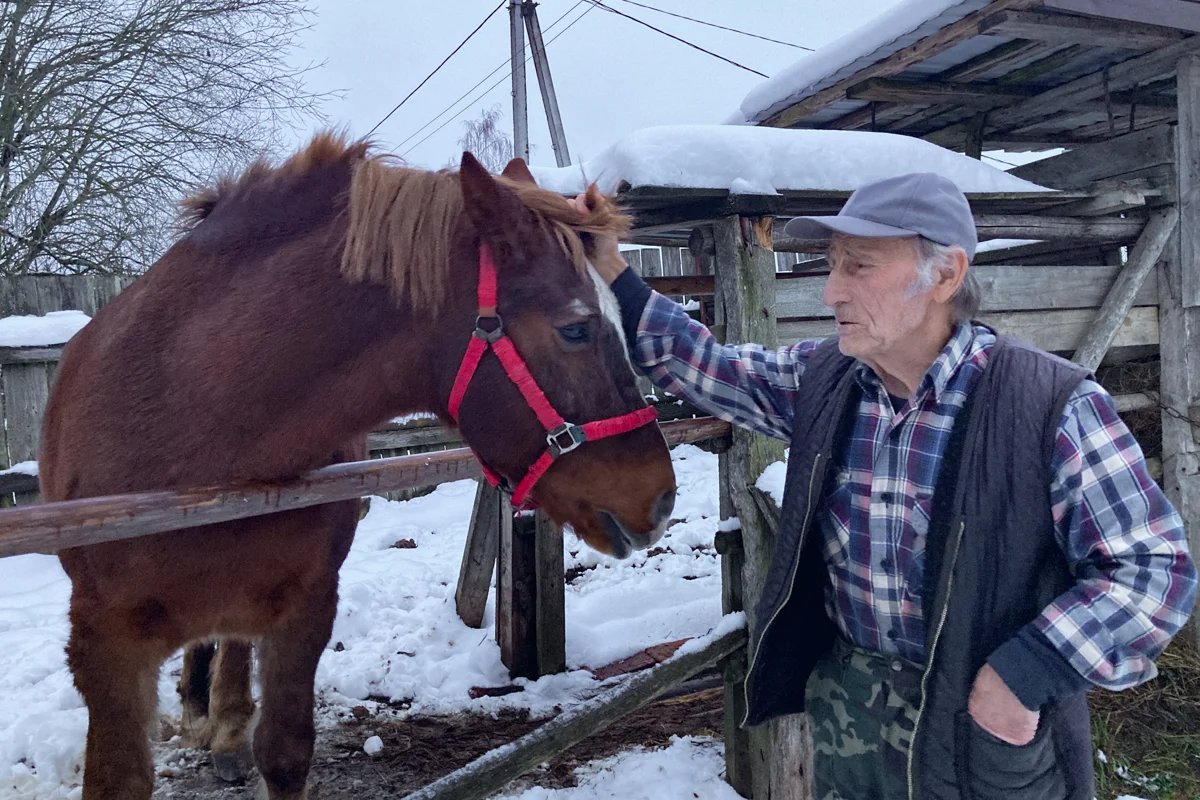
Yury with his horse, Boy. Photo: Irina Garina
Boy is an elderly horse, although Yury is unable to tell me quite how old. After considering the issue for some time, he decides that Boy is roughly his own age in horse years.
A Budushchee native, Yury was once married with a family, but as his son now lives in the city, he has lived alone since his wife died at 58. “The loneliness gets to you, of course,” he says. “And living here is hard. The shops have closed. There are no medical services.”
A large TV dominates Yury’s kitchen, and just as in Mikhail’s house, it is on non-stop, which shows. “I’m worried about politics,” Yury says. “I’m fed up of these Banderite Ukrainians. The fighting is into its third year, and look how they’ve dug in. All those regions — Kharkiv, Zaporizhzhia, some others too — should be part of Russia. Putin has told them his conditions. And they won’t agree,” he laments with frustration.
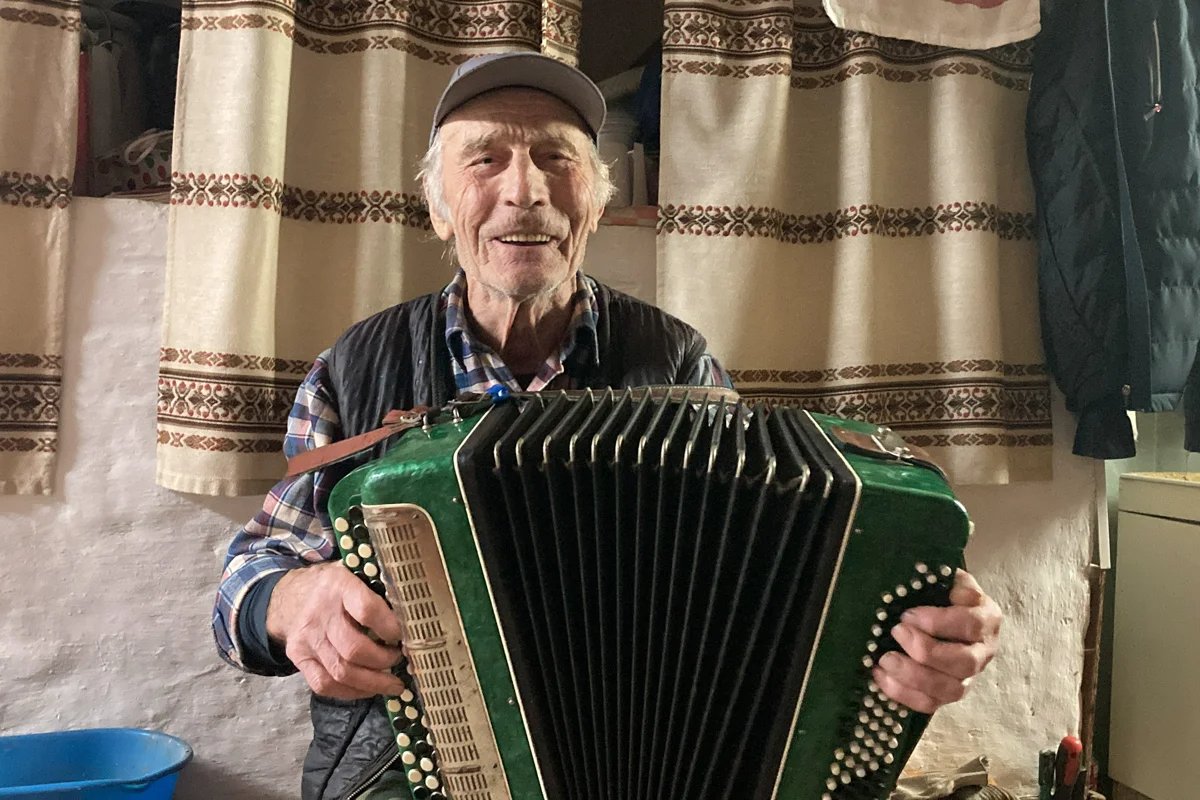
Yury plays the accordion. Photo: Irina Garina
“We used to be friends, Ukraine was a brotherly republic, but look what’s become of them,” he continues, unconsciously parroting the talking points relentlessly repeated in state media broadcasts. “We were too soft on them, and so they decided to join the European Union! And now Trump. What a troublemaker...”
Turning his attention to less weighty matters, Yury tells me how he dreams of entering a talent show where he would play the accordion. He proceeds to sing me one song after another — he knows dozens — and when he’s unsure of the words, he simply makes up his own.
“I think it’s time I wrote and asked to be invited onto a talent show. I’ve got arrhythmia, though, and I worry the stage-fright could kill me.”
Join us in rebuilding Novaya Gazeta Europe
The Russian government has banned independent media. We were forced to leave our country in order to keep doing our job, telling our readers about what is going on Russia, Ukraine and Europe.
We will continue fighting against warfare and dictatorship. We believe that freedom of speech is the most efficient antidote against tyranny. Support us financially to help us fight for peace and freedom.
By clicking the Support button, you agree to the processing of your personal data.
To cancel a regular donation, please write to [email protected]
